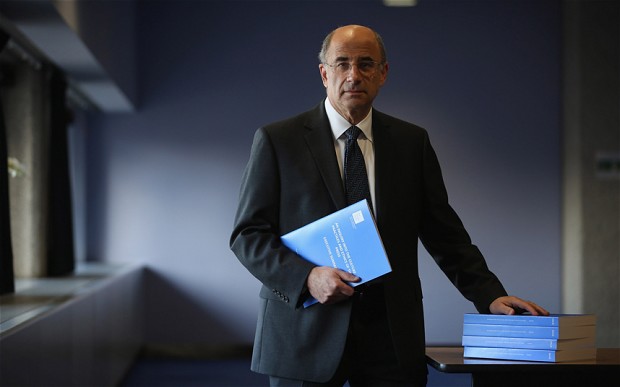Media Ethics: Leveson’s support for the Conscience Clause is a significant gain Comment
Ideas, New in Ceasefire - Posted on Sunday, December 2, 2012 14:46 - 1 Comment

Lord Justice Leveson’s report into the culture, ethics and practices of the media, a mammoth work stretching to 2,000 pages, was finally released to the public on Thursday (29 November). There’s an awful lot in the report and within an hour of it being published, parliament was split on the issue of using statute to underpin a new independent press regulator. The Prime Minister opposes that key element of the Leveson Report, with Labour, the LibDems, a large number of Tories and others challenging him.
However, within the Report itself and the subsequent debate, there was one clear message that things could improve for working journalists. Leveson recommended the National Union of Journalists (NUJ)’s proposal for a “conscience clause” for journalists and, when John McDonnell MP asked the Prime Minister whether newspaper organisations should meet the NUJ to establish it, David Cameron said he was happy to agree to that.
Those outside the industry might not realise how immense and important a sea-change in attitudes this represents. A conscience clause would be an element in individual journalists’ contracts that gave them the right to refuse any task that breached a specified ethical code (e.g. the successor to the Editor’s Code) but would not face disciplinary action or dismissal for doing so.
The NUJ has argued for a conscience clause for many years and, in 2003, was backed by the Commons Select Committee on Privacy and the Media. However, the Press Complaints Commission continued to oppose the measure, arguing instead that the editors were the keepers of ethics in the newsroom and journalists, effectively, had nothing to fear.
The NUJ’s evidence to the Leveson Inquiry begged to differ, in particular the anonymised evidence from working journalists too afraid of the consequences to allow their identities to be revealed. Before this could even be presented to the Inquiry, a legal challenge from Associated Newspapers (publishers of the Daily Mail) had to be tackled. The evidence details a culture of bullying, unrealistic demands, high stress and fear to speak out.
Some highlights from that evidence include the following testimonies from working journalists:
“I’d be given work to do with unrealistic deadlines. When I’d say anything, I’d just get screamed and shouted at in front of everyone. There’d be no time to make calls and get things right”
“On more than one occasion, execs were kicked out of the editor’s office and told to come back when they had some stories. The atmosphere as a result was incredibly tense and in the time I was at the paper three or four staff suffered physical collapses in the office, almost certainly to some extent as a result of the stress.”
“Humiliation was the most minor punishment for failure. Dismissal or relegation to the least favourable shifts, was much more common. A deliberate climate of fear and tension was created by management to improve performance. The only unwritten rule for those subjected to it were never complain publicly and never refuse an order.”
“I readily admit that I stole, bribed and cheated to obtain information. But it was the indiscriminate way this was carried out, as well as for what I felt were increasingly spurious ’public interest’ justifications, that fuelled my disillusionment and prompted me to leave and freelance.”
“On numerous occasions, knowing all too well that whatever balance or neutrality I incorporated into my stories would be changed or removed, I asked the news editors to remove my byline from the final piece. This earned me the reputation and nickname of the ’token leftie’ in the newsroom – and in what was often portrayed as a ’joke’, solely for the amusement of the news editors and reporters, I was targeted to produce the highest number of anti-Muslim stories.”
Richard Peppiat, the former Daily Star journalist, who publicly resigned over the newspaper’s anti-Muslim bias, was one of the few journalists who openly gave evidence [watch the video]– no longer having to fear career blight as he’s unlikely to ever work in Fleet Street again. He told the Inquiry:
“Now, tabloid newspapers have no interest in the moral sense. All they want to do is think: what can we get away with saying? How far with we push the boundaries and get away with it? As you see when you have these monsterings of people, it’s sort of: how far with we push it? If one newspaper pushes the line, everyone rushes to fill the void behind them. It’s just a matter of: what can we get away with saying? There’s no consideration of: what are the ethics?”
Michelle Stanistreet, in the NUJ’s evidence to the inquiry, stated that the union is “clear that journalists should be able to speak out when concerned about unethical practice and pressures to break the Code of Conduct, without the fear of losing their job or suffering adverse repercussions.” Rupert Murdoch, being questioned by the NUJ’s counsel John Hendy QC, agreed that he thought the conscience clause was a good idea.
Whatever happens next in parliament and the industry, whether statute is written or proposed, or whether the industry actually manages to come up with a system that enshrines the so-called “Leveson principles” without statute, the acceptance of the conscience clause by the industry is something that will make a real difference to working journalists’ lives.
The circumstances that led to the Leveson Inquiry – where some journalists engaged in illegal and unethical activities because they believed their careers depended on it – need to change. The conscience clause is one of the key tools the industry needs to adopt to make this change happen.
1 Comment
Media Ethics: Leveson’s support for the Conscience Clause is a significant gain | Pal Telegraph



[…] Source: https://ceasefiremagazine.co.uk/media-ethics-levesons-support-conscience-clause-significant-gain/ […]